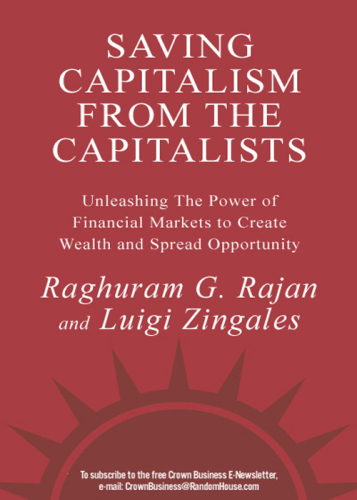
Saving Capitalism from the Capitalists
How Open Financial Markets Challenge the Establishment and Spread Prosperity to Rich and Poor Alike
- اطلاعات
- نقد و بررسی
- دیدگاه کاربران
نقد و بررسی

January 20, 2003
Rajan and Zingales take the Chicago school of economic theory in a new direction with an erudite, comprehensive defense of the free market system, steering a course between conservative isolationists and liberal antiglobalizationists. Only unfettered markets, rather than protectionism, they argue, can provide an environment supporting competition, innovation and economic growth. When businesses suffer losses or fail completely, it means competition is successfully weeding out the incapable—and the authors have nothing but harsh words for governmental attempts to prop up sagging industries through subsidies or tariffs on foreign competitors. They're honest in acknowledging that their "tough break" approach to failure offers little consolation to downsized laborers, but gamely suggest the economically "distressed" should recognize their options and look beyond obfuscating corporate rhetoric about "saving jobs." The book draws strong historical parallels between the half-century market clampdown following the Great Depression, when the public recoiled at the consequences of unmanaged economic risk, and the pessimism fostered by recent high-profile failures and corporate excesses. Because the authors view political support for the free market system as always tenuous, they offer suggestions on how to combat antimarket sentiments by promoting a stronger international market, which would reduce the ability of economic "incumbents" to persuade governments to suppress competition while offering workers some protection against the risks of failure. They argue their case well (though general readers may find some of the more academic passages tough going) and provide a clear new definition for the terms of the free market debate.

January 15, 2003
Given the downfall of such corporate giants as Enron and Worldcom, other white-collar malfeasance, and today's bearish stock-market conditions, it may not seem like such a great time for capitalism. In this provocative new book, however, two prominent University of Chicago economists provide a ringing defense on its behalf. They build their case incrementally by showing that if property rights can be respected under a trustworthy government and a workable market infrastructure established, capitalism should flourish. Although their wholehearted embrace of a free-market system as an unfailingly positive force may strike one as a bit Pollyannaish, they do acknowledge that capitalist systems are not foolproof, sometimes becoming sclerotic: "an economy that does not liberalize will not suffer a crisis, but will slowly die from a sedentary lifestyle." Solidly researched, deftly written, and well argued, this book occasionally lapses into academic turgidity, but it will surely become a best seller on university campuses for years to come. Recommended for academic libraries and larger business collections.-Richard Drezen, Washington Post, New York City Bureau
Copyright 2003 Library Journal, LLC Used with permission.

February 15, 2003
The authors, both professors of finance at the University of Chicago's graduate school of business, take an in-depth look at the advantages and shortcomings of free financial systems in a historical context. They argue that although free markets are often reviled, especially during economic downturns, the inherent risks involved and the propensity for some individuals and corporations to corrupt the system can be overcome somewhat. When markets are suppressed, as happened after the Great Depression, competition is stifled, and trade tariffs that are intended to benefit individual nations ultimately harm worldwide economic health. What role, then, should governments play in overseeing financial markets? Historically, so the authors show, respect for individual property rights is the essential first step, and when property is available to the widest classes of people who can actively manage it, the groundwork for free financial trading is laid. For advanced financial systems such asthat found in the U.S., the authors propose a balanced approach of government participation, including both measures to provide incentives for free markets and insurance for safety during times of crisis.(Reprinted with permission of Booklist, copyright 2003, American Library Association.)




دیدگاه کاربران